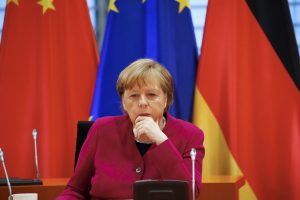Chinese Premier Li Keqiang and German Chancellor Angela Merkel joined up via video link on April 28 to co-host the sixth round of China-Germany intergovernmental consultations. The two leaders listened to work reports on China-Germany from 25 different departments, “including foreign affairs, economy and trade, judiciary, finance, industry, transportation, education, science and technology, health, agriculture, environmental protection, and social security,” according to a read-out from the Chinese Foreign Ministry.
According to a Germany’s Federal Foreign Office, the talks placed a special emphasis, unsurprisingly, on the global challenges of the COVID-19 pandemic and climate change. The two sides signed a number of agreements, including one on climate cooperation, after the consultations.
The talks, first held a decade ago, are a testament to the depth and breadth of China-Germany relations. But this round came at a fraught moment for ties, as the European Union reconsiders its China policy amid growing China-U.S. competition.
Li seized on the opportunity to emphasize that “China and Germany are all-round strategic partners, and win-win cooperation is the defining feature of the bilateral relationship.”
“In the face of a major pandemic, the international community must send a strong message of cooperation and show the strength of unity. China is willing to firmly grasp the general direction of dialogue and cooperation with Germany,” Li said. But he qualified that with a long list of “conditions”: “As long as both sides can respect each other’s core interests and major concerns, communicate on an equal footing without interference in each other’s domestic affairs, dispel misgivings, narrow differences and concentrate on cooperation, favorable conditions for further dialogue and cooperation will be created.”
In other words, to ensure “favorable conditions” Germany will have to stop speaking out about problems in the relationship, especially human rights issues within China. Merkel, however, pressed for the opposite, expressing a wish for expanded human rights dialogues, including on Hong Kong.
The meeting on April 28 followed on from an April 21 virtual meeting between Chinese Foreign Minister Wang Yi and German Foreign Minister Heiko Maas, which focused on security and foreign policy cooperation. There was a touch of defensiveness in the Germany Federal Foreign Office’s summary of the dialogue, which noted that “there are a number of conflicts – especially in China’s neighbourhood – that can only be resolved by means of close and constructive dialogue with China.”
Similarly, Maas emphasized the need for continued cooperation with China. “I n the EU, we frequently say that we view China in several ways at once: as a partner, a competitor and a systemic rival. We need to keep all three dimensions equally in mind,” he said. “And for all three dimensions we need strong, viable lines of communication with Beijing.”
He also emphasized the need for dialogue “on difficult issues” such as “human rights and the rule of law.” Aside from those issues, highlighted by the crisis in Xinjiang, China and Germany face friction over questions of market access as well as China’s role in developing critical technology (like 5G networks) in Germany.
As frictions mount, there is a crossroad looming for China-EU ties broadly, and China-Germany ties specifically. China is trying hard to keep Germany and the EU on side as the China-U.S. rivalry heats up. Coordinated sanctions in March between the EU, U.S., U.K., and Canada over rights abuses in Xinjiang dealt blow to China’s hopes. Talks with Germany are a chance for China to play up the benefits of cooperation – and warn against forming “cliques” on the international stage, as Wang did during his meeting with Haas.
Adding to the uncertainty, Merkel is on her way out, after a 16-year stint in power during which she invested quite a bit of time and energy into the China-Germany relationship. Merkel personally has played a crucial role in prioritizing relations with China. The China-EU investment agreement reached late last year was a long-standing priority for her; it’s no coincidence the announcement was made while Germany held the rotating presidency of the EU. Merkel had originally dreamed of announcing the deal while hosting a historic summit between China’s President Xi Jinping and the EU heads of government. The COVID-19 pandemic precluded that idea, but Merkel pushed the investment agreement through. (Its ultimate fate, however, is still undetermined, as it faces opposition in the European Parliament.)
The political transition in Germany comes at a crucial moment for its approach to China. Like much of the Western world, Germany has seen a marked spike in negative opinions of China over the past year, hitting record high of 71 percent in a Pew survey last October. That’s just two points behind the U.S., although Germany had far more respondents choose the “somewhat unfavorable” (48 percent, compared to 31 percent in the U.S.) versus the “very unfavorable” option. The same poll found that 78 percent of Germans “have no confidence in Chinese President Xi Jinping to do the right thing regarding world affairs.”
With Germany poised for an election, China is becoming a campaign issue – and the next government might be less positively inclined toward Beijing than Merkel was. The Greens, currently leading in the polls, have been one of the most outspoken parties about China’s rights abuses and national security threats.
The next stress test for relations will come in mid-May, when Germany’s parliament will discuss whether to join the growing number of countries labeling the situation in Xinjiang a genocide.

































